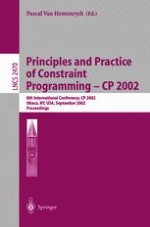2002 | OriginalPaper | Chapter
A Relational Constraint Solver for Model-Based Engineering
Authors : Jakob Mauss, Frank Seelisch, Mugur Tatar
Published in: Principles and Practice of Constraint Programming - CP 2002
Publisher: Springer Berlin Heidelberg
Included in: Professional Book Archive
Activate our intelligent search to find suitable subject content or patents.
Select sections of text to find matching patents with Artificial Intelligence. powered by
Select sections of text to find additional relevant content using AI-assisted search. powered by
Model-based applications in engineering, such as diagnosis, configuration or interactive decision-support systems, require embedded constraint solvers with challenging capabilities. Not only consistency checking and solving, but also the computation of (minimal) conflicts and explanations are required. Moreover, realistic models of engineered systems often require the usage of very expressive constraint languages, which mix continuous and discrete variable domains, linear and non-linear equations, inequations, and even procedural constraints. A positive feature of the models of typical engineered systems is, however, that their corresponding constraint problems have a bounded and even relatively small density (induced width).We present here our relational constraint solver RCS that has been specifically designed to address these requirements. RCS is based on variable elimination, exploiting the low-density property. To analyze a set of constraints, RCS builds a so-called aggregation tree by joining the input constraints and eliminating certain variables after every single join. The aggregation tree is then used to compute solutions, as well as explanations and conflicts. We also report some preliminary experimental results obtained with a prototype implementation of this framework.
